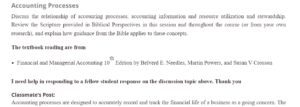Accounting Processes
Response to Classmate
Hello, great post!! What you say is true; a company cannot just independently decide the value of its assets and use the figures to conjure an attractive image of financial strength for its shareholders. This is a form of dishonesty, especially when assets are under/over-valued to give the desired net balance. Thus, accounting processes are needed. It is indeed unfair weights that the Bible talks about.
Are you seeking an initial copy of “Accounting Processes”? Reach out to us.
You have also mentioned Joseph as an example of a good steward. It makes me think that Christians have an advantage, especially those who make it a habit to commune with God daily. Joseph could plan and save the ‘world’ because of his relationship with God. Can you imagine how the corporate world would change if God directed all the decisions made? Can you imagine how many failed mergers would be averted if Josephs were in the corporate world? How about the stock exchange; it would flourish with Christian investors able to have foresight.
This, I believe, can happen for the Bible states in Deuteronomy 28:1-13 that when we obey the voice of the Lord, being careful to do all He commands, then we shall be the heads and not the tails, among other blessings. So it’s up to the church to train and encourage believers to be more hearers of the voice even as they are doers of the Word. When we listen to His voice, we will not be inclined to unfair weights and measures, but instead, we will multiply our talents by 30-60-100 fold.
Other Related Post: Communication Dilemma
ORDER A PLAGIARISM-FREE PAPER HERE
We’ll write everything from scratch
Question
Accounting Processes
Discuss the relationship between accounting processes, accounting information, resource utilization, and stewardship. Review the Scripture provided in Biblical Perspectives in this session and throughout the course (or from your research), and explain how guidance from the Bible applies to these concepts.

Accounting Processes
The textbook reading is from
- Financial and Managerial Accounting 10th Edition by Belverd E. Needles, Martin Powers, and Susan V Crosson
I need help responding to a fellow student’s post on the abovementioned discussion topic. Thank you
Classmate’s Post:
Accounting processes are designed to accurately record and track the financial life of a business as a going concern. The reason for all this tracking is to ensure that all resources are used to their maximum financial potential – not wasted, in other words (Needles, Powers, & Crosson, 2014)
In particular, Recognition, Classification, and Valuation are critical concepts of GAAP to ensure the most accurate records (Needles et al. 2014). One item that has become controversial is asset valuation. Some corporations and even FASB have changed how some assets are Classified and Valued. So far, the result is that company financial statements look better, meaning stockholders make more money. However, this is not considered standard accounting practice. But from the company’s viewpoint, they might consider it acting as good stewards for shareholders.
From a Biblical perspective, this change could be compared to using “unbalanced weights,” which the book of Proverbs warns against. Also, Jesus overturned the money changer tables in the Temple for using unjust scales. It may seem extreme, but the entire accounting system could also be altered if companies can arbitrarily decide what an asset is and it’s worth.
Joseph and the Master of the Talents can be contrasted as stewards. Joseph obviously couldn’t waste any grain. He had to know the population of Egypt and the surrounding countries who would be coming to buy grain – luckily, God gave him a head start since he knew how long the famine would last. The Master of the Talents gave out his “grain” ahead of time in the form of Talents. He wasn’t picky about the method used to maximize his resources, but he wanted his money to gain some interest. He also didn’t say how long the servants would have to maximize his funds. It’s like someone giving you $10,000 to start a business and make it profitable, but they don’t say what months you have. In any case, that’s not a good excuse. The point is that all the servants knew that money should grow, not just be buried in a hole.
As stewards, we may not get a second chance if we ruin our credit or falsify our income taxes. Likewise, if we live off an unrealistic budget, we could permanently find ourselves in a bad financial situation. Finally, we should treat our life like a “going concern.” We should expect it to last long and adjust our financial practices to reflect it.
References
Needles, B. E., Powers, M., & Crosson, S. V. (2014). Financial and managerial accounting. Mason, OH: South-Western, Cengage Learning.
Ramanna, K. (2014, August 01). Why “Fair Value” Is the Rule. Retrieved July 16, 2019, from https://hbr.org/2013/03/why-fair-value-is-the-rule

